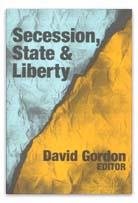 Mt. Pleasant, SC – As little as I wished to make my first post for FPR an overtly political essay on contemporary affairs – I had meant to rumination growing up in a small village attendant upon farmlands in upstate New York – I was compelled by the events of the last few weeks to say a few words on the new phenomenon of serious discussion of secession. And secession is, anyway, a core principle of decentralism and self-determination, having to do with the distribution of power, approximate self-government, and the proper scale of human endeavors that I would take to be inherent in the Front Porch Republic.
Mt. Pleasant, SC – As little as I wished to make my first post for FPR an overtly political essay on contemporary affairs – I had meant to rumination growing up in a small village attendant upon farmlands in upstate New York – I was compelled by the events of the last few weeks to say a few words on the new phenomenon of serious discussion of secession. And secession is, anyway, a core principle of decentralism and self-determination, having to do with the distribution of power, approximate self-government, and the proper scale of human endeavors that I would take to be inherent in the Front Porch Republic.
It is heartening that at last, thanks to a few off-the-cuff remarks by Texas governor Rick Perry on “tea-party” day, people are starting to talk about secession in these not-very-United States, and for the most part taking the concept seriously. (”Secession Talk,” as the New York Times put it, “Stirs Furor.”) It’s the first time it has been a genuine subject in American public discourse, says Emory University secession scholar Donald Livingston, since the war of Southern Independence was settled in 1865.
So it’s no surprise that a lot of people have completely misunderstood it, and that the nerve in their knees often impels them to declare it illegal and unconstitutional. Robert Schlesinger, a columnist for U.S. News, is typical: under a headline “Texas Can’t Secede,” he wrote that “one third of the voters think the state has the legal right to secede from the Union.” Then, so sure of his errant position he could get cutsey, he added, “Ummm, no,” and went on to scold them for being so ignorant.
But the plain truth is that Texas has that right, and so do the other 49 states.
May 2, 2009



